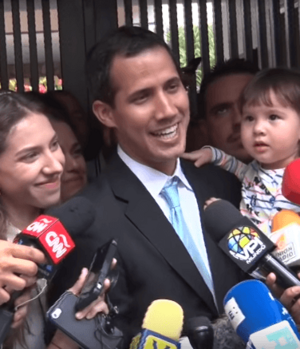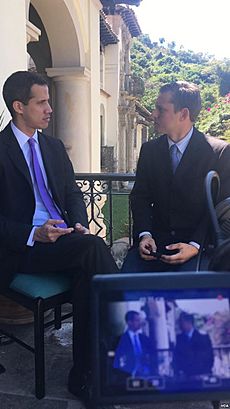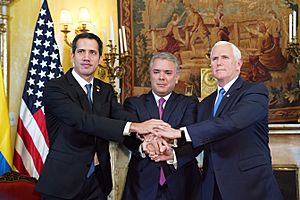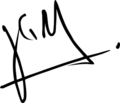Juan Guaidó facts for kids
Quick facts for kids
Juan Guaidó
|
|
|---|---|
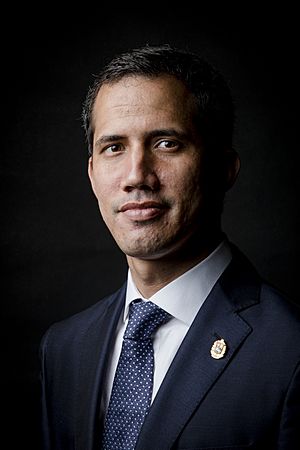
Official portrait, 2019
|
|
| Interim President of Venezuela | |
| In office 23 January 2019 – 5 January 2023 Disputed with Nicolás Maduro |
|
| Preceded by | Nicolás Maduro |
| Succeeded by | Nicolás Maduro |
| 10th President of the National Assembly of Venezuela | |
| In office 5 January 2019 – 5 January 2023 |
|
| Vice President | Edgar Zambrano Juan Pablo Guanipa |
| Preceded by | Omar Barboza |
| Succeeded by | Dinorah Figuera |
| Majority Leader of the National Assembly of Venezuela | |
| In office 5 January 2018 – 5 January 2019 |
|
| Preceded by | Stalin González |
| Succeeded by | Carlos Prosperi |
| Member of the National Assembly of Venezuela | |
| In office 5 January 2016 – 5 January 2021 |
|
| Constituency | Vargas |
| Personal details | |
| Born |
Juan Gerardo Guaidó Márquez
28 July 1983 La Guaira, Venezuela |
| Political party | Independent (since 2020) Popular Will (2009–2020) |
| Spouse | |
| Children | 2 |
| Education | Andrés Bello Catholic University George Washington University |
| Profession | Engineer, politician |
| Signature |  |
Juan Gerardo Antonio Guaidó Márquez (born 28 July 1983) is a Venezuelan politician. He was a member of the Popular Will political party. He served as a federal deputy in the National Assembly for the state of Vargas. He was a key figure in the political challenges against Nicolás Maduro from 2019 to 2023.
Guaidó's political journey started as a student leader during the 2007 Venezuelan protests. He later helped create the Popular Will party in 2009. In 2010, he was elected as an alternate deputy in the National Assembly. He became a full deputy in 2015. In 2019, his party nominated him to be the President of the National Assembly. On 23 January 2019, the National Assembly, which did not accept the 2018 presidential election results, declared Guaidó as the acting president of Venezuela. This began a period of political disagreement in Venezuela.
The Maduro government took actions against Guaidó. They froze his money in Venezuela and started investigations. After an attempt to encourage change in April 2019, Guaidó and Maduro's representatives began talks. In January 2020, security forces stopped Guaidó and other lawmakers from entering the parliament building. Most lawmakers then held a meeting and re-elected Guaidó as their leader. Security forces often blocked Guaidó and other opposition lawmakers from entering parliament.
In 2021, Guaidó suggested a "national salvation agreement." He proposed talks with Maduro for fair elections, with international help. This was in exchange for lifting international sanctions. Guaidó also worked on a "Country Plan" for Venezuela. He offered an amnesty law for military members who supported his side. He also tried to bring humanitarian aid into the country. Internationally, Guaidó gained control of some Venezuelan assets in the United States and United Kingdom. He also appointed diplomats recognized by countries that supported him.
In December 2022, major opposition parties decided to change the interim government. They wanted a smaller group to manage foreign assets. Dinorah Figuera was chosen as Guaidó's successor on 5 January 2023. This ended his claim to the presidency. In April 2023, he left Venezuela for the United States. He said he feared being arrested. In October 2023, the Maduro government accused Guaidó of misusing public funds and claiming a role he wasn't officially given. They issued an arrest warrant. Guaidó has denied these accusations.
Contents
Early Life and Education
Juan Guaidó was born on 28 July 1983. He grew up in a middle-class family in La Guaira, Venezuela. His parents are Wilmer and Norka. His father was an airline pilot, and his mother was a teacher. His grandfathers were involved in the military. His parents divorced when he was young. His father moved to the Canary Islands.
Guaidó experienced the 1999 Vargas tragedy. This was a series of mudslides in his home state. Some of his friends died, and his school and home were destroyed. This event made him and his family homeless. He often mentions this event in his speeches. His colleagues say that the government's slow response to the mudslides influenced his political views.
He and his family lived in a temporary home in Caracas. He finished high school in 2000. Guaidó continued to live in Caracas. He earned his degree in industrial engineering in 2007 from Andrés Bello Catholic University. He worked to pay for his studies. He also completed two postgraduate programs in public administration. These were at UCAB and the Instituto de Estudios Superiores de Administración (IESA).
Early Activism
Guaidó said that he became involved in student politics when it seemed the country was moving towards a one-party system. In 2007, he joined student protests against the government's decision to close the independent TV network RCTV. He also protested other government changes proposed by then-President Hugo Chávez. Chávez lost the vote on these changes.
In 2009, Guaidó helped found the Popular Will political party. This was with Leopoldo López and other politicians. The party is linked to Socialist International.
By 2014, Guaidó was a national leader for his party. Leopoldo López, a main opposition politician, guided Guaidó for many years. They spoke often. López chose Guaidó to lead the Popular Will party in 2019. Guaidó was well-known within his party and the National Assembly. However, he was not widely known internationally before this.
Role in the National Assembly

In the 2010 Venezuelan parliamentary election, Guaidó was elected as an alternate national deputy. He was one of several politicians who went on a hunger strike in 2015. They demanded parliamentary elections. He was then elected as a full deputy in the 2015 elections. He received 26% of the votes. Vargas, his home state, was a poor area. Many state-run companies employed most of the people there. Before Guaidó's election in 2015, candidates from the ruling party had often won without challenge.
In 2017, he became the head of the National Assembly's Comptroller's Commission. In 2018, he led the legislature's opposition. He also helped with research at the University of Arizona. He spoke about the working conditions of politicians in Latin America. He also discussed political change and problems in government.
In the National Assembly, Guaidó investigated cases of corruption. These cases involved the Maduro government. He worked with independent groups to try and get back money that was believed to be stolen from the Venezuelan people. He took part in the 2017 Venezuelan protests. During one protest, security forces broke his arm and shot him with rubber bullets. He says these left scars on his neck. In January 2018, he became the Leader of the Majority in the National Assembly.
President of the National Assembly
An agreement for rotating the presidency meant that Popular Will would lead in 2019. Since the party's top officials were in prison or exile, Guaidó was chosen as president in December 2018. He was sworn in on 5 January 2019. Relatives of imprisoned politicians were invited to the ceremony. At 35, Guaidó was the youngest person to lead the opposition. Soon after becoming president of the legislature, Guaidó began to push for a law to create a temporary government.
Two politicians, Julio Borges (in exile) and Leopoldo López (under house arrest), were mainly responsible for the plan that brought Guaidó to power. This plan was developed after failed talks between the government and opposition in 2017. It took over a year to create. Other politicians and experts were also involved. Borges worked on international efforts, like with the Lima Group. López and Guaidó contacted the United States Department of State. They presented a plan to declare Guaidó interim president. They hoped the United States would lead other nations to support this. United States Secretary of State Mike Pompeo supported the plan.
When he took office, Guaidó promised to oppose Maduro. He created an action plan approved by the National Assembly. This plan had three main goals: end the current government, form a temporary government, and hold free elections. It also had eight key points.
Brief Detention
On 13 January 2019, Guaidó was briefly held by members of the Bolivarian Intelligence Service (SEBIN). This happened while he was on his way to a public meeting. He was released 45 minutes later. Many international groups condemned this action. The Maduro government said the detention was done by SEBIN staff acting on their own. Twelve SEBIN officials were charged for their actions.
Guaidó said that this event showed a break in the military's chain of command. He claimed that Maduro was not fully in control.
Re-election as Assembly President
The election for the National Assembly's leaders on 5 January 2020 was disrupted. Two people claimed to be the president of the National Assembly: Guaidó and Luis Parra. Parra was an independent lawmaker. He had been removed from his previous party due to accusations, which he denied. Parra declared himself president, and the Maduro government welcomed this. The opposition disagreed, saying not enough members were present for a valid vote. Police blocked some opposition members, including Guaidó, from entering the parliament. Later that day, 100 of the 167 deputies voted to re-elect Guaidó as president in a separate meeting. In his speech, Guaidó announced he was leaving the Popular Will party.
Guaidó was sworn in on 7 January after pushing past police barriers. On the same day, Parra repeated his claim to the presidency.
Claim to Presidency
After what he and others called the "illegitimate" inauguration of Maduro on 10 January 2019, Guaidó challenged Maduro's claim to the presidency. The National Assembly stated that Guaidó was ready to take on the duties of president. They called for protests on 23 January. This date was the 61st anniversary of the overthrow of a past dictator. Before Guaidó's announcement, Vice President of the United States Mike Pence called Guaidó. He told him that the United States would support his efforts.
On 23 January, Guaidó declared himself acting president and took an oath at a rally in Caracas. The United States quickly recognized him as president. Canada and other countries in Latin America and Europe followed. Russia, China, and other nations supported Maduro. Maduro accused the United States of trying to overthrow his government. He said he would cut ties with the US. Guaidó denied these accusations. He said his movement was peaceful and supported by volunteers.
The Supreme Tribunal of Justice (TSJ) rejected the National Assembly's decisions. However, the Supreme Tribunal of Justice of Venezuela in exile supported Guaidó as acting president.
On 29 January 2019, the TSJ started an investigation into Guaidó. They froze his money and stopped him from leaving the country. A United Nations expert said these actions were not fair or legal.
By 1 April 2021, the European Union no longer recognized Guaidó as Venezuela's rightful president. This was after he lost his position as head of parliament. The United States and the United Kingdom continued to recognize him in 2021. However, the United States stopped recognizing Guaidó in January 2023. This happened when the opposition voted to end Guaidó's interim government.
Key People Supporting Guaidó
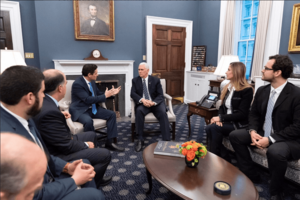
Guaidó had help from other young politicians. These included Stalin González and Edgar Zambrano, the National Assembly vice-presidents. Miguel Pizarro worked on humanitarian aid. Carlos Paparoni led a Finance Commission. Marialbert Barrios worked with embassies. Delsa Solórzano worked on the Amnesty Law. David Smolansky was the coordinator for the Venezuelan migrant and refugee crisis for the OAS.
Carlos Vecchio was accepted as Guaidó's diplomatic representative to the US. Julio Borges represented Venezuela in the Lima Group. The National Assembly appointed many other diplomats. These included Elisa Trotta Gamus to Argentina and María Teresa Belandria to Brazil.
Gustavo Tarre Briceño was named Venezuela's Permanent Representative to the Organization of American States (OAS). This was on 29 January 2019. On 9 April, the OAS voted to accept Tarre Briceño as Venezuela's ambassador. This decision weakened Maduro's international standing. It also marked a step in officially recognizing Guaidó's government.
The National Assembly allowed Guaidó to appoint new directors for the state oil company PDVSA and its US subsidiary, Citgo. With Citgo under Guaidó's control, the US Treasury allowed it to continue operating despite US sanctions.
Guaidó named José Ignacio Hernández as a special lawyer. This made Hernández the first official with state power under Guaidó. Ricardo Hausmann was named Venezuela's representative to the Inter-American Development Bank. The bank recognized Hausmann instead of Maduro's representative.
Maduro's prosecutor general, Tarek William Saab, said Guaidó's appointments were part of an illegal power grab. He started an investigation into these appointees. Maduro's Supreme Court later said the appointments were invalid. They accused the National Assembly of overstepping its powers.
Attempted Arrest
On 12 July 2021, officials from the Special Action Forces (FAES) went to Guaidó's home. They surrounded him in his garage for twenty minutes. They used explosives against his armored vehicle. The arrest was stopped because of his vehicle and his neighbors and supporters. Guaidó said the officers did not identify themselves or show an arrest warrant. On the same day, former deputy Freddy Guevara was arrested.
End of Interim Government
On 30 December 2022, three main opposition parties voted to end the interim government. They wanted to create a smaller group of five members to manage foreign assets. They said the interim government had not achieved its goals. The opposition National Assembly approved this change. They were looking for a united plan for the 2024 presidential elections. The change was approved with 72 votes in favor.
Domestic Affairs
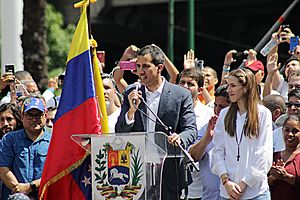
In a 2019 article, Guaidó said that Venezuela had a very high crime rate. He also said that many people were leaving the country. He stated that many Venezuelans had been killed during protests. He also mentioned that there were many political prisoners. His plan to fix these problems had three parts: restore the democratic National Assembly, get international support, and allow people to choose their own future.
Amnesty Law
On 25 January 2019, Guaidó offered an Amnesty Law. This law was approved by the National Assembly. It was for military personnel and officials who helped remove Maduro from power. He suggested that if Maduro gave up power, he might receive amnesty. He held a public meeting. He asked supporters to share the Amnesty Law with military and police. On 30 January, people protested across the country. They encouraged the military to allow humanitarian aid and reject Maduro. Maduro also met with the military. Most top military leaders remained loyal to Maduro in early 2019.
Guaidó explained that the law would only apply to individuals who had not committed serious crimes against humanity.
By April 2019, about 1,400 Venezuelan military personnel had left their posts. They crossed the border into Colombia. Another 60 crossed into Brazil.
Elections
Guaidó told CNN in February 2019 that he would call elections 30 days after Maduro left power. He did not say if he would run for president. He said discussing that was "too early."
A law for a democratic transition was approved on 5 February. On 6 March 2019, a group was formed to plan for elections.
Economy and Finance
Guaidó asked the Bank of England and the British Prime Minister not to return Venezuela's gold reserves to the Maduro government. He asked them to allow the opposition to use it instead. The US Treasury also placed sanctions on PDVSA. They transferred control of some Venezuelan assets to Guaidó.
Guaidó said the Maduro government was trying to move some of the country's money to Uruguay. He said this was "to keep stealing from the people of Venezuela." In February, it was announced that a transfer from Portugal to Uruguay had been stopped.
Guaidó wanted to open up the economy. He aimed to allow foreign oil companies to work more with PDVSA. He would remove the rule that PDVSA must own 51% of joint projects. He promised to honor "legal" and "financial" debts. However, he said that agreements where Venezuela paid debt with oil might not be honored.
Humanitarian Aid Efforts
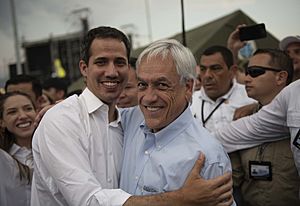
Guaidó said that hospitals in Venezuela lacked basic supplies. He also stated that children were dying from not enough food. He made bringing humanitarian aid a top priority. He said this would also test the military's loyalty. The day after becoming acting president, Guaidó asked the US and the United Nations for humanitarian aid. He said Venezuela's neighbors would help get aid into the country. Products would be sent to nearby ports and brought in by convoys. He said 250,000 people whose lives were in danger would get the first aid. He traveled to Cúcuta, Colombia, in February 2019. He wanted to be there when the aid entered. However, Maduro's security forces blocked the aid.
The International Federation of Red Cross and Red Crescent Societies announced in March 2019 that they would bring aid to Venezuela. This was to help with hunger and the medical crisis. Guaidó said that Maduro's acceptance of aid was due to their efforts. He asked Venezuelans to watch closely to make sure the aid was not misused. The Red Cross increased its aid budget for Venezuela. This was after reports about the crisis and Maduro's change in stance.
Media and Communications
On 23 April 2019, Guaidó named Alberto Federico Ravell as his spokesperson. Ravell was the former CEO of the news channel Globovisión. He became director of Guaidó's National Center of Communications. In January 2020, Guaidó announced new directors for the National Commission of Telecommunications (CONATEL). He said that "Telesur will no longer be a propaganda tool of the regime."
Plan País
On 31 January, Guaidó announced a plan for Venezuela's reconstruction. It was called Plan País (Plan for the Country). This plan had been developed through meetings in the US and Venezuela. Guaidó said the plan aimed to "stabilize the economy, address the humanitarian emergency, fix public services, and overcome poverty." It included ideas to improve PDVSA and the health sector. It also offered help to the poorest people. The plan required Maduro to leave power to be put into action.
Efforts to Remove Maduro
Operation Freedom
Guaidó announced a tour of the country starting 16 March. He aimed to organize groups for "Operación Libertad" (Operation Freedom). The goal was to take control of the presidential residence, Miraflores Palace. As part of his tour, he visited Petare, a large slum, on 12 April.
On 30 April, Guaidó shared a video of himself with opposition leader Leopoldo López. López had been released from house arrest. They were with members of the Venezuelan armed forces. Guaidó announced the "final phase" of Operation Freedom. He asked Venezuelans to go out and support democratic forces. He also asked them to mobilize military units. The Associated Press reported that López was released by security forces following an order from Guaidó. Some military personnel and civilians joined Guaidó.
The head of the Bolivarian Intelligence Service, Manuel Cristopher Figuera, spoke out against the Maduro government. He was removed from his position and went into hiding. However, the expected military defections did not happen. By the end of the day, one protester had died, and at least 100 were injured. López went to the Spanish embassy. Twenty-five military personnel sought safety in the Brazilian embassy. On 1 May, Guaidó's call for a large march did not fully happen. His supporters were forced back by security forces using tear gas. Guaidó admitted he did not get enough military support. He called for strikes starting on 2 May.
Guaidó's support began to decrease after this event. Some wondered if Guaidó and the opposition could remove Maduro.
Strategic Committee
In August 2019, Guaidó asked JJ Rendón and a committee to look into ways to remove Maduro. Members of the Strategic Committee argued that various laws and treaties justified action against Maduro.
Rendón said the Strategic Committee had talked to many groups about removing Maduro. These groups asked for large payments. He then contacted Jordan Goudreau, who owned Silvercorp USA. Goudreau offered to capture or remove Maduro from Venezuela for a large sum of money. Rendón signed an agreement with Silvercorp in October 2019 on behalf of the Guaidó government. Guaidó's representatives later pulled out of Goudreau's plan. Goudreau was later involved in a failed attempt in May 2020.
After the failed attempt, Guaidó's team first said they had no connection to any security company. Rendón later admitted that an "exploratory agreement" had been signed with Silvercorp. This was to try and capture members of Maduro's government.
Experts said that Guaidó's reputation was damaged by this incident. Some felt that the opposition had run out of options.
Talks with Maduro's Government
Guaidó said the National Assembly would not talk with Maduro. He stated that past talks had only led to more repression. He said Maduro used these talks to strengthen his position. He gave examples of political prisoners. He asked other countries to join him. Guaidó said that Maduro did not respect the conditions of 2016 talks. He suggested that the Pope should encourage Maduro to allow a smooth transfer of power.
After a failed attempt to encourage change, representatives of Guaidó and Maduro began talks. These were helped by the Norwegian Centre for Conflict Resolution. No agreement was reached after the second meeting.
On 9 July 2019, talks started in Barbados. Representatives from both sides were present. On 15 September, Guaidó announced that the opposition ended the talks. This was because the government had not attended for forty days.
In late March 2020, the United States suggested a temporary government. This government would not include Maduro or Guaidó as president. The US said it would lift sanctions if Maduro agreed to hold elections without himself running. The deal would involve sharing power between different government groups. Elections would need to be held within a year. All foreign military forces would have to leave. The US was still seeking Maduro's arrest at that time. The EU also agreed to remove sanctions if the deal happened.
Guaidó accepted the proposal. However, Venezuela's foreign minister rejected it. He said only parliamentary elections would happen that year.
Reports said that allies of both Maduro and Guaidó had secretly started talks during the COVID-19 pandemic. Guaidó and US officials denied that negotiations had taken place.
In 2021, Guaidó proposed negotiations with Maduro. He wanted a schedule for free and fair elections. This would be in exchange for lifting international sanctions.
On 5 August 2021, Mexico announced it would host talks between Maduro and the opposition, including Guaidó. Guaidó said he would push for guarantees for fair elections.
Foreign Affairs
Guaidó said there was room for long-term allies like Russia and China in Venezuela. He added that a new plan for the country would benefit all businesses, including theirs. He tried to establish diplomatic ties with China. He said China's support would be important for Venezuela's economy. He also tried to convince China and Russia that it was in their interest to stop supporting Maduro.
Guaidó promised that Cuban influence in Venezuela would end. He said Cuban individuals were welcome to stay, but not in decision-making roles or the armed forces. In March 2019, the National Assembly voted to cut Venezuela's oil supply to Cuba. This would save about US$2.6 million daily.
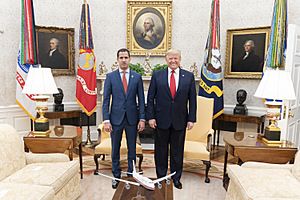
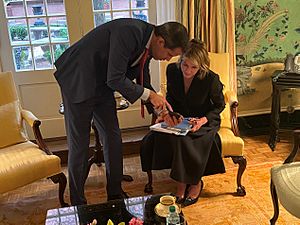
Guaidó wanted to restore relations with Israel. Chávez had ended relations with Israel over ten years earlier.
Guaidó has supported Venezuela's claim to land in the Guyana–Venezuela territorial dispute.
In June 2019, the United Nations reported that four million Venezuelans had left the country. Many did not have a valid passport. The National Assembly decided to extend the lifespan of Venezuelan passports. The United States and Canada accepted this decision. They recognized Venezuelan passports for five years beyond their printed expiration date.
In September 2019, Guaidó named several groups as terrorist organizations. These included the Revolutionary Armed Forces of Colombia (FARC) and the National Liberation Army (ELN). He ordered state security forces to protect Venezuela's borders from these groups.
After an American airstrike killed Iranian Commander Qasem Soleimani in January 2020, Guaidó commented on it. He also accused Nicolás Maduro of allowing Soleimani's groups to operate in Venezuela.
Diplomatic Representatives
As of July 2019, the National Assembly had approved Juan Guaidó's appointment of 37 ambassadors and foreign representatives.
| Organization/country | Official |
|---|---|
| Gustavo Tarre Briceño | |
| Inter-American Development Bank | Alejandro Plaz |
| Lima Group | Julio Borges |
| Carmen Alguindingue | |
| Elisa Trotta Gamus (2019–2020) | |
| Alejandro Martínez | |
| Mary Ponte | |
| María Teresa Belandria | |
| Estefanía Meléndez | |
| Orlando Viera Blanco | |
| Guarequena Gutiérrez | |
| Vacant | |
| María Faría | |
| Vacant | |
| Enrique Ser Horst | |
| Eusebio Carlino | |
| René de Sola | |
| Isadora Zubillaga | |
| Otto Gebauer | |
| Eduardo Fernando Massieu | |
| María Teresa Romero | |
| Claudio Sandoval | |
| Enrique Alvarado | |
| Pynchas Brener | |
| Angelina Jaffe | |
| Felipe Zoghbi | |
| José Ignacio Guédez | |
| Gloria Notaro | |
| Fabiola Zavarce | |
| David Olsen | |
| Carlos Scull | |
| Ana Medina | |
| José Rafael Cotas | |
| Memo Mazzone | |
| Antonio Ecarri Bolívar | |
| León Poblete | |
| María Alejandra Aristeguieta | |
| Vanessa Neumann | |
| Carlos Vecchio |
In January 2020, Guaidó announced he would appoint diplomatic representatives to Bolivia, El Salvador, and Uruguay.
The European Union (EU) announced on 6 January 2021, that it could no longer legally recognize Guaidó as interim president. This was after he lost his position as head of parliament. However, they did not recognize Maduro as the legitimate president either.
In January 2022, opposition parties voted to extend Guaidó's term as interim president for another year. They also created a committee of opposition lawmakers. This committee would take over managing foreign affairs. Guaidó's role then became "defending democracy" and managing Venezuela's overseas assets. These assets included the oil refiner Citgo and gold in the Bank of England. Guaidó was required to keep the committee informed about how he spent the funds.
In September 2022, Colombian President Gustavo Petro said Guaidó was a "non-existent" president. He said Guaidó had no control over the country. Petro announced that his government would only recognize the Maduro government. Guaidó criticized Petro's change in policy.
Military Involvement
In an interview, Guaidó did not rule out accepting support from the US armed forces. However, he said that other ways of pressure were being used to avoid armed conflict.
Some members of the Venezuelan opposition and desperate residents have called for outside help. Talk of foreign intervention has become common in Venezuela. At Guaidó's protests, many signs asked for the approval of a part of the Constitution. This part allows the National Assembly to approve foreign missions in Venezuela. A March 2019 poll showed strong support for foreign intervention. Guaidó has said he will call for intervention "when the time comes." However, in interviews, he has not said he supports removing Maduro by force. He has said the decision "cannot be taken lightly."
Latin American Tour
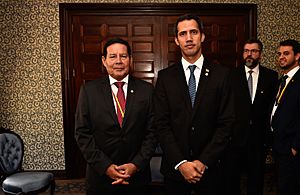
Guaidó defied the travel ban placed on him by the Maduro government. He attended Richard Branson's February 2019 Venezuela Live Aid concert in Cúcuta, Colombia. The concert aimed to raise money and awareness for humanitarian aid. Guaidó was met by Colombian president Iván Duque. He was welcomed by a crowd chanting, "Juan arrived!" After failing to get humanitarian aid into Venezuela, Guaidó and US vice president Pence attended a meeting in Bogotá. From there, he traveled to meet with the presidents of Brazil, Paraguay, Argentina, and Ecuador. He discussed ways to rebuild Venezuela and challenge Maduro.
Venezuela's National Assembly approved Guaidó's trip. Because he left the country despite a travel ban, he faced possible imprisonment upon his return. Maduro said Guaidó was welcome to return but would face legal action. Guaidó announced he planned to return despite the threats. He said Maduro's "regime" was "weak."
Guaidó returned to Caracas from Panama on a commercial flight. The Washington Post described his "triumphant return" to "wild cheers from supporters" at Venezuela's main airport on 4 March. He then went to an anti-government protest. He spoke to thousands of people. He honored those who had died in border clashes. He said that immigration officials had greeted him with "welcome, president." He added that it was clear some people did not follow orders. He said the chain of command in the government security forces was broken.
After Guaidó's tour, a government official accused him of not explaining how he paid for the trip. He claimed there were differences between Guaidó's spending and income. The official said Guaidó's trips cost a lot of money. Based on these claims, the official said Guaidó would be banned from running for public office for fifteen years. Guaidó responded that only the legitimate parliament could appoint such an official. Legal experts said that only criminal courts could make such decisions. They also said it would violate Guaidó's parliamentary immunity.
Investigation of Representatives in Colombia
In June 2019, a news report claimed that Guaidó's representatives in Colombia had misused money. This money was meant for defecting soldiers' housing. The representatives were accused of using money for personal purchases. Both denied the claims.
Guaidó's office removed the representatives from their positions. They asked the Colombian government and other groups to investigate. The Venezuelan embassy in Colombia said Guaidó and the ambassador agreed to an audit. Venezuelan political parties supported the investigation. Colombia's Foreign Minister condemned the alleged corruption. He urged authorities to investigate. A reporter said Guaidó's envoy in Colombia had started looking into this two months earlier. Guaidó said preliminary investigations began before the article was published.
Political Views
Guaidó was a member of the social-democratic Popular Will party. He is now an independent. His colleagues describe him as a centrist. However, Maduro places him on the right side of the political spectrum. Regarding US politics, Guaidó said he was not very familiar with it. He commented that what Americans call "socialist" is what Venezuelans would call "Social Democrat."
Life After Presidency Claim
Guaidó was forced to leave Venezuela on 25 April 2023. This happened when he entered Colombia for a conference. Colombia considered sending him back to Venezuela. However, Guaidó was eventually sent to the United States. He has since lived in Miami, Florida. In September 2023, he joined Florida International University as a visiting professor. He was paid for one semester.
Legal Accusations
On 6 October 2023, Maduro's Attorney General issued an arrest warrant for Guaidó in Venezuela. He was accused of misusing public funds and claiming a role he wasn't officially given. The Attorney General said Guaidó's actions cost Venezuela a lot of money.
The Maduro government also asked Interpol to issue a special notice for Guaidó's arrest. However, Interpol has not issued such notices against opposition officials in the past. Guaidó denied all the accusations. An expert said that the government had officially placed Guaidó in the same group as other exiled opposition politicians. This means he is banned from returning but no longer seen as a major threat. A former US official called the accusations "nonsense" and "completely false." He said Venezuelan assets were overseen by the US Treasury. He denied any funds were misused.
Personal Life
Guaidó is married to journalist Fabiana Rosales. They married in 2013. They have two daughters, Miranda and Mérida Antonieta. Guaidó is also a Freemason.
Public Perception
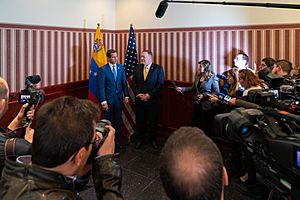
Before leading the National Assembly, Guaidó was not well-known. The BBC reported that opposition parties chose him as a compromise leader. A Venezuelan lawyer who knew Guaidó from early student protests described him as someone who brought people together. He said Guaidó helped unite the opposition.
A Bloomberg article said he is known for "building unity among fellow legislators." An expert said he tried to reach out to the military and unite the opposition.
In April 2019, Time magazine named Guaidó to its list of the 100 most influential people. Former Colombian president Juan Manuel Santos wrote his profile. Santos described Guaidó as "young, energetic, articulate, determined" and courageous. Santos said Guaidó was able to unite the opposition. He became a symbol of hope for Venezuela. However, another expert wrote that Guaidó was initially popular. But his attempts to remove Maduro failed, and his support decreased.
Public Opinion Polls
After the failed attempt to encourage change in April 2019, support for Guaidó decreased. Fewer people attended his protests. After plans to remove Maduro failed in May 2020, Guaidó's support dropped further. Maduro kept control of the country's security forces. Polls in October 2021 showed Guaidó's support in Venezuela had fallen to 16%. This was partly due to accusations against some of his representatives outside the country.
| Polling company | Dates | Location | Number polled |
Results |
|---|---|---|---|---|
| Meganálisis | 5–9 May 2020 | Venezuela | 957 | 88.3% of people believed Guaidó could not govern Venezuela. |
| Meganálisis | 2–13 March 2020 | Venezuela | 1,350 | 71.0% recognized Maduro as president. 23.7% saw neither as president. 3.0% recognized Guaidó as president. |
| Meganálisis | 23 January–7 February 2020 | Venezuela | 1,480 | 63.8% of people did not support Guaidó. 10.7% supported Guaidó. |
| Meganálisis | 25 November–2 December 2019 | Venezuela | 1,580 | Guaidó had an approval rating of 10.3%. |
| Hercon Consultores | September 2019 | Venezuela | 1,200 | 72.9% of people recognized Guaidó as president. 18.3% recognized Maduro. |
| Datincorp | 2 June 2019 | Venezuela | 1,200 | 36% recognized Guaidó as president. 41% recognized Maduro as president. |
| Hercon Consultores | 8–17 May 2019 | Venezuela | 1,000 | 70.3% recognized Guaidó as president. 12.1% recognized Maduro. |
| Meganálisis | 2–4 May 2019 | 16 Venezuelan states, 32 cities |
1,120 | 49.8% recognized Guaidó as president. 4.2% recognized Maduro. |
| Datanálisis | May 2019 | Venezuela | – | 56.7% approved of Guaidó. 10.1% approved of Maduro. |
| Hercon Consultores | 1–4 April 2019 | Venezuela | 1,000 | 77.9% recognized Guaidó as president. 14.5% said Maduro was president. |
| Meganálisis | 28–30 March 2019 | 16 Venezuelan states, 32 cities |
1,040 | 54.9% recognized Guaidó as acting president. 6.6% said Maduro was president. |
| Meganálisis | 11–14 March 2019 | 16 Venezuelan states, 32 cities |
1,100 | 63.3% recognized Guaidó as acting president. 5.0% said Maduro was president. |
| Datanálisis | Published 2 March 2019 |
Venezuela | Guaidó approval at 61%. Maduro approval at 14%. | |
| Hercon Consultores | Published March 2019 | Venezuela | 1,000 | 73.4% recognized Guaidó as president. |
| Hercon Consultores | 24–27 February 2019 | Venezuela | 1,000 | 80.3% recognized Guaidó as president. |
| Consultores 21 | 19–20 February 2019 | 8 Venezuelan states, Capital District | 300 | 54% recognized Guaidó as the legitimate president. 35% recognized Maduro. |
| Meganálisis | 13–16 February 2019 | 16 Venezuelan states, 32 cities |
1,250 | 78.9% recognized Guaidó as acting president. 4.2% said Maduro was president. |
| Datincorp | 10 February 2019 | Venezuela | 1,200 | 49.33% recognized Guaidó as acting president. 33.81% said Maduro was president. |
| Meganálisis | 4–6 February 2019 | 16 Venezuelan states, 32 cities |
1,020 | 82.9% recognized Guaidó as acting president. 3.5% said Maduro was president. |
| Meganálisis | 30 January – 1 February 2019 |
16 Venezuelan states, 32 cities |
1,030 | 84.6% recognized Guaidó as acting president. 4.1% said Maduro was president. |
| Hercon Consultores | 25–30 January 2019 | Venezuela | 999 | 81.9% recognized Guaidó as president. 13.4% said Maduro was president. |
| Meganálisis | 24–25 January 2019 | 16 Venezuelan states, 32 cities |
870 | 83.7% recognized Guaidó as president. 4.8% recognized Maduro as president. |
| Meganálisis | 19–20 January 2019 | 16 Venezuelan states, 32 cities |
900 | 81.4% hoped that Guaidó would be sworn in on 23 January. 84.2% supported a temporary government. |
| Hercon Consultores | 15–19 January 2019 | Venezuela | 1,100 | 79.9% agreed with Maduro leaving the presidency. 68.6% agreed with the National Assembly swearing in Guaidó as acting president. |
Electoral History
2015 Parliamentary Vote
- 2015 Venezuelan parliamentary election, Deputy for Vargas (1st district).
| Candidate | Party | Votes | % | Result |
|---|---|---|---|---|
| Milagros Eulate | MUD | 98,530 |
26.29%
|
Deputy |
| Juan Guaidó | MUD | 97,492 |
26.01%
|
Deputy |
| María Carneiro | PSUV | 84,872 |
22.64%
|
Not elected |
| José Pinto | PSUV | 83,462 |
22.27%
|
Not elected |
| Jesús Sánchez | DR | 2,098 |
0.55%
|
Not elected |
| Estela Romero | DR | 1,886 |
0.55%
|
Not elected |
| Disqualified votes | 35,569 |
8.66%
|
||
| Total valid votes | 374,773 |
74.64%
|
||
2012 MUD Primary
- 2012 Democratic Unity Roundtable presidential primary, pre-candidate for governor of Vargas.
| Candidate | Party | Votes | % | Result |
|---|---|---|---|---|
| José Manuel Olivares | PJ | 17,547 |
61.1%
|
Nomination |
| Juan Guaidó | VP | 5,184 |
18.1%
|
Not elected |
| Salomón Bassim | PJ | 2,280 |
7.9%
|
Not elected |
| Arquímides Rivero | GDV | 1,819 |
6.3%
|
Not elected |
| Ramón Díaz | Ind. | 1,625 |
5.7%
|
Not elected |
| Luis Pino | CC | 264 |
0.9%
|
Not elected |
| Total valid votes | 28,719 | |||
2010 Parliamentary Vote
- 2010 Venezuelan parliamentary election, reserve deputy for Vargas.
| Candidate | Party | Votes | % | Result |
|---|---|---|---|---|
| Oswaldo Vera | PSUV | 84,241 |
54.82%
|
Deputy |
| Simón Escalona | Reserve deputy | |||
| Bernardo Guerra | MUD | 66,553 |
43.31%
|
Deputy |
| Juan Guaidó | Reserve deputy | |||
| Others | 2,865 |
1.81%
|
||
| Disqualified votes | 4,352 |
2.75%
|
||
| Total valid votes | 153,659 |
63.86%
|
||
Images for kids
See also
 In Spanish: Juan Guaidó para niños
In Spanish: Juan Guaidó para niños
 | William M. Jackson |
 | Juan E. Gilbert |
 | Neil deGrasse Tyson |


